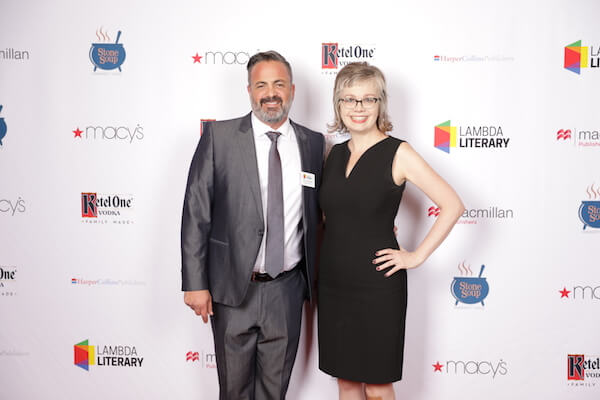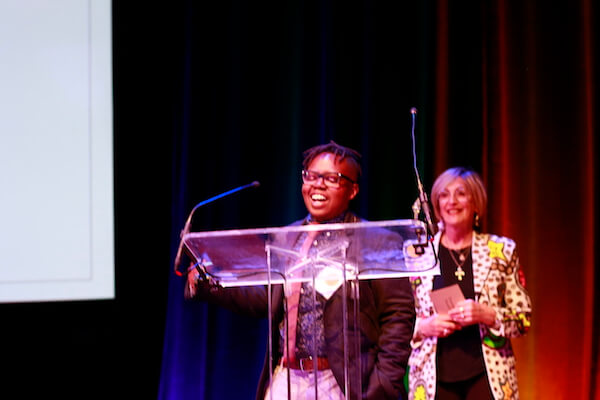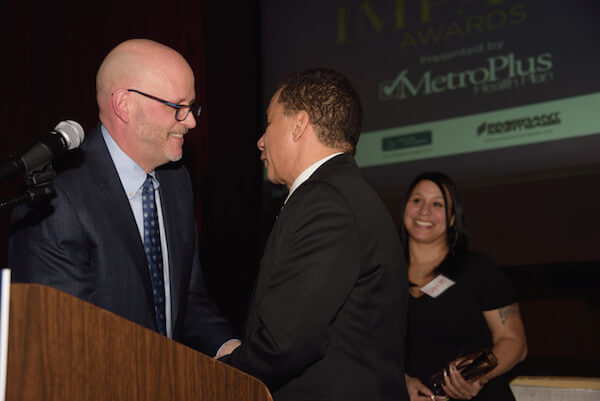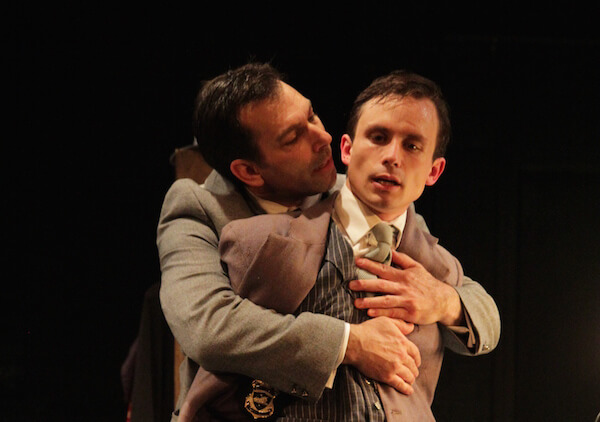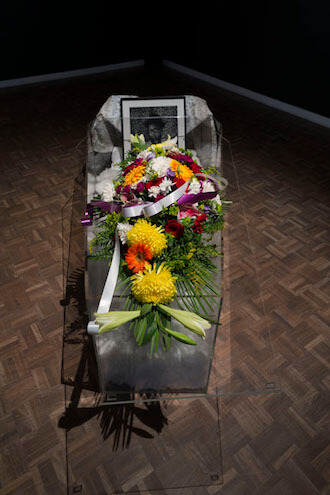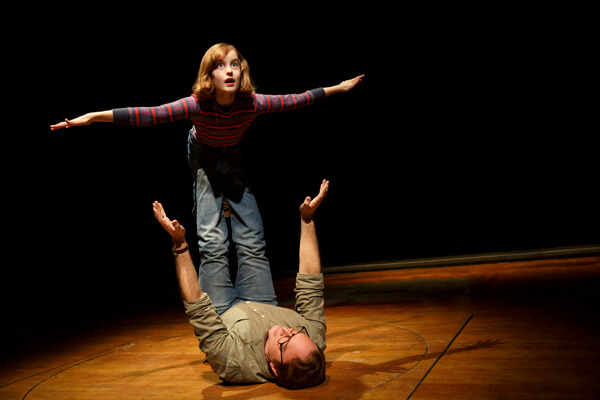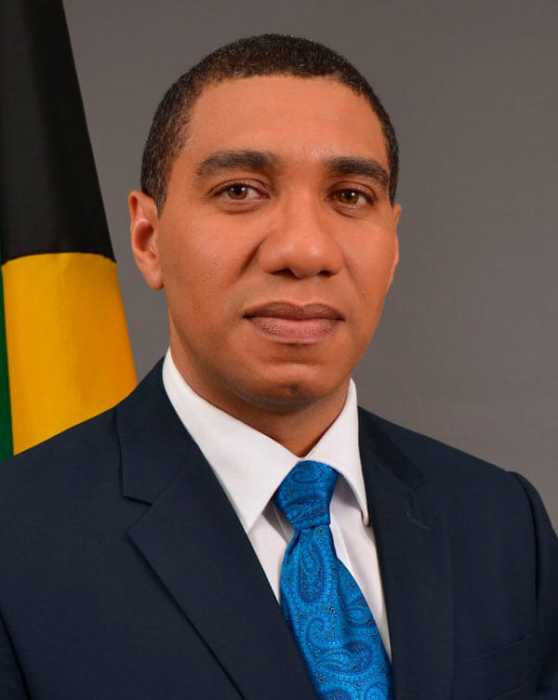Roxane Gay, who won both the Trustees Award for Excellence in Literature and the Bisexual Nonfiction Award for her book “Hunger.” | BRIAN CHRISTOPHER SARGEANT/ COURTESY OF LAMBDA LITERARY
It was a fierce crowd — both in presentation and emotion — that gathered to celebrate the 30th annual Lambda Literary Awards on the day the Supreme Court handed down a decision supporting a bigoted baker.
Clad in bright, dark, and fabulous suits and gowns (and shorts and kilts), several hundred literary lions and their friends gathered at NYU’s Skirball Center in Greenwich Village to celebrate outstanding work in LGBTQ literature and drama as well as the tenure of outgoing executive director Tony Valenzuela.
“It’s the 30th anniversary, a great milestone,” said the show’s director Charles Rice-Gonzalez (co-founder of the Bronx Academy of Arts & Dance, BAAD). “We’ve got a bevy of stars, and we’re celebrating Tony.”
Lambda Literary holds its 30th anniversary awards gala
Comedian Kate Clinton hosted, starting with a welcome that drew cheers from the groups of artists she named (with perhaps the loudest cheers for the poets), finishing with thanks to the teachers and the readers. Clinton thanked the Lammies for having her back as host, despite her “triggering name,” and said she hoped we were in the “end days of the Viagracene Epoch,” and that with people boycotting the “National Fascist League” they would use their football-free Sundays to “make America cake again.”
This year, winners who couldn’t be present at the ceremony were given a chance to make an acceptance speech via a recorded video message.
Novelist Lucy Jane Bledsoe and performance artist/ poet Alok Vaid-Menon presented the evening’s first awards, for LGBTQ Children’s/ Young Adult Book, Graphic Novel, and Anthology.
Rebecca Podos was the first winner, for her Young Adult novel “Like Water.” Juliana Delgado Lopera’s “¡Cuéntamelo!: Oral Histories by LGBT Latino Immigrants” won in the Anthology category, and Emil Ferris took home the Lammy for Graphic Novel with “My Favorite Thing is Monsters.”
The Lesbian, Gay, and Transgender Poetry Awards were presented by Pamela Sneed and Rigoberto González.
Rosamond S. King won the Lesbian Poetry Award for “Rock | Salt | Stone” and said her book’s title was for “people who are told to live on a rock and suck salt and have stones thrown at them.”
CA Conrad won the Gay Poetry Award for “While Standing in Line for Death,” and in their video acceptance speech, they thanked “everybody I’ve ever met.” Ching-In Chen’s “recombinant” won for Transgender Poetry, and they also accepted with a heartfelt video.
A video chronicling 30 years of Lambda tracked the organization’s founding from when L. Page (Deacon) Maccubbin, owner of Lambda Rising Bookstore in Washington, DC, published the first Lambda Book Report in 1987 and presented the first awards in 1989 into the 21st century, illustrated with excerpts from ceremonies, speeches, and photos of now-iconic authors winning their first awards.
Lambda Literary’s outgoing executive director Tony Valenzuela with board president Amy Scholder. | BRIAN CHRISTOPHER SARGEANT/ COURTESY OF LAMBDA LITERARY
Valenzuela got the evening’s first standing ovation in his remarks with board president Amy Scholder, telling how he was recently asked, “Do the Lammies still matter?” In other words, he said, “Now that you have these rights, do we need your culture?” He spoke about how amidst “a daily assault on decency, we have a community that has your back.” Expressing deep gratitude for his nine years with the organization, Valenzuela then introduced poet Sue Landers, the incoming executive director.
Rick Whitaker presented the Visionary Award to Edmund White, with an introduction of “found sentences” from White’s books, a conceit that was clever, funny, and touching. The iconic author and activist walks more slowly these days, but gave a soaring speech, telling the audience “from the very beginning, we are explaining ourselves.”
White recalled that an editor once asked him, “Don’t you wish you hadn’t called yourself a gay writer?”
“If I were straight, I’d be an entirely different person,” White said. He told of writing to “justify, to celebrate,” and noted that to his earliest readers he was “indispensible,” which was not to praise himself, he said, but a recognition that his work allowed people to identify themselves at a time when there was little else to turn to.
Visionary Award honoree Edmund White. | BRIAN CHRISTOPHER SARGEANT/ COURTESY OF LAMBDA LITERARY
Throughout the evening, the idea of pushing back against erasure as a queer artist and creating work for people who don’t have a voice was a running theme.
S. Chris Shirley presented the Lesbian and Gay Mystery Awards with Taylor Trensch (from Broadway’s “Dear Evan Hansen”). A.E. Radley’s “Huntress,” and Marshall Thornton’s “Night Drop” took the awards.
Michael Nava presented the LGBTQ Studies and Nonfiction Awards. Keeanga-Yamahtta Taylor’s “How We Get Free: Black Feminism and the Combahee River Collective” won the Nonfiction prize, and “Punishing Disease: HIV and the Criminalization of Sickness,” by Trevor Hoppe, won the LGBTQ Studies prize.
Hoppe told the audience, “There are people behind bars because they have HIV! HIV is not a crime.” Then, urging people to work to change current laws, he added, “Vote in the midterms!”
Michele Karlsberg received the Publishers Professional Award. A former publisher, current publicist, organizer, and essential member of the LGBTQ literary community, Karlsberg’s speech rang with gratitude to her mentors and friends, sharing glimpses of memorable moments, including “an evening in a hot tub with Dorothy Allison and Jewelle Gomez, and I was the only one in a bathing suit.”
Afterward, Karlsberg said, “I found myself overwhelmed with bittersweet memories of writers that are no longer here with us. Personally it was an emotional evening — I just wanted to represent those that could not be there. I feel it is my responsibility to always call their names. This literary community has been home to me for 30 years — it has saved my life.”
Bluestockings Bookstore, the intrepid Lower East Side indie emporium and community gathering spot, also received a Publishers Professional Award.
Jeanne Thornton and Mecca Jamilah Sullivan, winners of the Judith A. Markowitz Award for Emerging LGBTQ Writers, presented the awards for LGBTQ Drama and Bisexual Fiction and Nonfiction.
Barbara Browning’s “The Gift” won for Bisexual Fiction, and the author talked about how in these “distressing times, what can I tell my students? I tell them to keep making experimental love and weird art.”
“I didn’t see that coming,” said Roxane Gay, when she was named as the winner of Bisexual Nonfiction for her book “Hunger.” Gay thanked the Lammies for honoring her “memoir about my body in a world that is inhospitable to my body.”
Audrey Cefaly’s “The Gulf” won for Drama, and in her acceptance speech, she stressed how much the recognition means to getting the work to new audiences.
The evening’s emcee, comedian Kate Clinton. | BRIAN CHRISTOPHER SARGEANT/ COURTESY OF LAMBDA LITERARY
“Tailor-Made” by Yolanda Wallace took the Lesbian Romance Award, and the author was overcome by emotion as she talked about how as a little girl she’d worn Tuffskin jeans to protect herself from taunts and bullying, until “I discovered something to keep my tender skin safe — the written word.”
“Love and Other Hot Beverages” by Laurie Loft won the Gay Romance Award, and Loft’s video acceptance speech was a crowd favorite, as her cat sat on her shoulder, alternately staring at the camera and ignoring it.
The crowd also loved the titles of the books in the LGBTQ Erotica category, applauding loudly when “His Seed,” an anthology edited by Steve Berman, won the award. In Berman’s recorded speech, he thanked his readers and told us to “eat your vegetables.”
Rebecca Solnit, dapper in a dark suit, introduced Roxane Gay again for the Board of Trustees Award for Excellence in Literature. “I’m just a simple straight girl,” Solnit demurred. “But I’m from San Francisco, which helps.”
Gay received a standing ovation as she took to the stage, and she told the audience, “I write because I just love writing. I feel free and strong and brave. I feel joy.” She emphasized the pleasure of writing in the face of “expectations placed on the shoulders of marginalized people” who are expected to write about their trauma for public consumption.
“I do not want us as queer writers to deny ourselves the pleasure of writing,” Gay said. “I want queer writers to put our work into the world regardless of how that will or will not meet the expectations of those who will read it.”
The In Memoriam segment brought a hush to the audience, and people applauded, sighed, and called out names as the faces flashed by on the screen, set to a song by Michael Callen. Perhaps the largest cheer was for Ursula K. Le Guin, and the montage finished with a photo of comic and author Bob Smith.
Paula Vogel and Alison Bechdel (who could be called Team Broadway) presented the next set of awards.
Annalee Newitz’s “Autonomous,” a novel set in a future ruled by Big Pharma, won the LGBTQ Horror/ SF/ Fantasy category.
Alexandria Marzano-Lesnevich won the Lesbian Memoir/ Biography Award for “The Fact of a Body: A Murder and a Memoir.” The author took the stage and said how she’d been told that the book was “too much”: a true crime story about the murder of a child, combining memoir and her own abuse.
“I was asked, ‘Who do you think is going to read this? It’s too much!,’” she recalled. “But ‘too much’ is the way it is.”
Chiké Frankie Edozien, winner in the Gay Memoir/ Biography category for his “Lives of Great Men: Living and Loving as an African Gay Man.” | BRIAN CHRISTOPHER SARGEANT/ COURTESY OF LAMBDA LITERARY
Chiké Frankie Edozien won the award for Gay Memoir/ Biography with “Lives of Great Men: Living and Loving as an African Gay Man.”
Kate Bornstein took a break from rehearsals for her Broadway debut (in Young-Jean Lee’s “Straight White Men”) to present, with poet Tommy “Teebs” Pico, the Transgender Fiction and Nonfiction Awards.
“With all the right-wing lies going around about trans people, I’m surprised they aren’t nominated for Transgender Fiction,” Auntie Kate said tartly.
“Transcendant 2: The Year’s Best Transgender Speculative Fiction,” edited by Bogi Takács, took the award for Transgender Fiction, and the editor thanked their “spouse person” and “child person” in their video message.
“Black on Both Sides: A Racial History of Trans Identity,” by C. Riley Snorton, won the Nonfiction Award.
C. Riley Snorton, winner of the Trans Nonfiction Award for “Black on Both Sides: A Racial History of Trans Identity,” with Kate Bornstein, who presented the honor, in the background. | BRIAN CHRISTOPHER SARGEANT/ COURTESY OF LAMBDA LITERARY
Nancy Bereano, the pioneering founder of Firebrand Books, and Nicole Dennis-Benn, last year’s Lammy winner for her debut novel, presented the Lesbian and Gay Fiction Awards.
Carmen Maria Machado won the Lesbian Fiction prize for “Her Body and Other Parties,” and told the audience, via her video speech, “Stories exist whether or not we commit them to the page.” She thanked her publisher and readers and said of her book, “She’s yours now!”
John Rechy, the 87-year-old author of the pioneering gay novel “City of Night” (1963), took home this year’s Lammy for Gay Fiction with his “After the Blue Hour.”
Kate Clinton, who’d been tracking the evening’s fundraising campaign and urging audience members to contribute, announced that the goal of $10,000 had been met and exceeded, and closed the ceremony, just after 9 p.m., with a few more words of thanks to Valenzuela.
The happy crowd milled around the lobby, before dispersing, some for the afterparty at (le) poisson rouge, some for the airport, and the rest off to whatever else was the next stop on their journey.
Tony Valenzuela and Lambda Lit’s incoming executive director, Sue Landers. | TAMIKA HERNANDEZ/ COURTESY OF LAMBDA LITERARY

